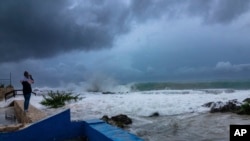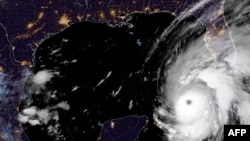Hurricane Ian has made landfall over western Cuba just hours after evolving as a major hurricane.
Forecasters at the Miami-based National Hurricane Center say Ian is carrying maximum sustained winds of 205 kilometers an hour, making it a Category 3 storm on the center’s five-level scale that measures a storm’s maximum sustained wind speed and destructive potential.
The storm is just 10 kilometers south of the province of Pinar del Rio, traveling at a speed of 19 kilometers an hour. Officials in Pinar del Rio evacuated tens of thousands of residents ahead of Ian’s arrival and took steps to protect its vital tobacco crops and its related infrastructure.
The NHC says Ian will remain a major hurricane as it travels over the Gulf of Mexico on Wednesday. It is expected to reach the western Gulf Coast of the southern U.S. state of Florida as early as Wednesday and take a direct path towards the cities of Tampa and St. Petersburg. The area has not sustained a direct hit by a major hurricane since 1921.
Forecasters have issued hurricane, tropical storm and storm surge warnings and watches for parts of western Cuba and Florida that are in the current path of Hurricane Ian. The storm is expected to produce between 15 to 25 centimeters of rainfall in western Cuba, with the Florida Keys expected to receive 10 to 15 centimeters and central west Florida to get between 15 to 30 centimeters of rainfall.
Parts of western Cuba are also expected to experience life-threatening storm surges, flash flooding and possible mudslides Tuesday, as well as devastating wind damage. The NHC says parts of Florida’s western coast could see storm surges between 60 to 304 centimeters thanks to Hurricane Ian.
U.S. President Joe Biden has issued an emergency declaration for Florida, authorizing the Federal Emergency Management Agency to coordinate disaster-relief efforts and provide more federal funding. Authorities have issued evacuation orders for hundreds of thousands of residents along Florida’s Gulf Coast. The potential devastation from Ian has even prompted officials with the U.S. space agency NASA to roll its massive Artemis 1 moon rocket and Orion space capsule from its launch pad at the Kennedy Space Center — located on Florida’s eastern coast — back to the Vehicle Assembly Building, further delaying its planned test flight.
Some information for this report came from The Associated Press and Reuters.

